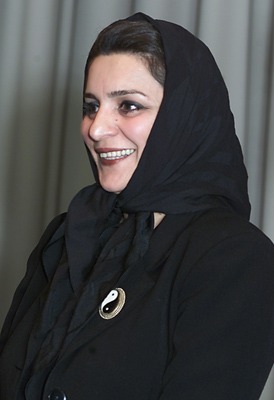
Tahmineh Milani Talks Back
Written by Stephanie Scott | Posted by: Anonymous
Picture this: you’re relaxing with your family, ensconced in the cozy confines of your home, when officials burst in, grab you without an explanation and throw you into solitary confinement. Your spouse can’t save you and doesn’t even know where you are. Your house and office are raided, and your personal belongings are snatched. Freedom vanishes in an instant.
On August 27th, Tahmineh Milani endured such a nightmare. Iran’s favorite female filmmaker was seized in her home and tossed into jail where she sat in the darkness while frantic questions whizzed through her mind.
Nearly three months later, in Boston’s Museum of Fine Arts, Milani, 41, and her husband, Mohammad Nikbin, 48, are sitting around a conference room table rehashing her tale. Milani blinks her heavily made-up eyes and fixes her powerful gaze on me. She speaks in rapid Farsi and her words tumble after each other, saturated in sarcasm. Even with the language barrier I can sense her spunk.
She speaks little English, so her husband translates her quip, "How would you feel if you were arrested in your own home?"
Milani reeks of feistiness and glamour. A headband holds back her raven colored hair and her rosy cheeks match her ruby sweater. She sports jeans and a black blazer, and is adorned with only a simple gold wedding ring. Her hands dance through the air as she talks, and she is famous for her fearlessness.
Filmmaking and feminism are a risky combination in Iran, and this time, Milani may have taken artistic expression too far.
"Basically we believe this has been a misunderstanding," says Nikbin.
Gina, their five and a half year old daughter, sits next to me, clad in a glittery gold shirt and sparkly jeans. She is oblivious to the serious conversation and makes funny faces when I catch her eye.
The silly antics of this carefree little girl are a startling paradox to the grave situation facing her mother. Upon the release of Milani’s latest film, "The Hidden Half," the Islamic Revolutionary Court accused her of "supporting those waging war against God" and "misusing the arts in support of counterrevolutionary and armed opposition groups."
If she is convicted of these charges, the penalty could be death.
Milani was born in Tabriz in 1960. "She studied architecture at the University of Tehran, but her main interest was always cinema," Nikbin explains. "Her parents were not that eager for her to pursue film because it had a bad reputation in Iran before the revolution."
To appease her family but satisfy her heart, Milani simultaneously studied architecture and started working as a set designer, script girl, and assistant to prominent directors in Iran.
Her debut feature, "Children of Divorce" was co-winner of the Best First Film Prize at the 8th Fajr Film Festival in 1989, and her international breakthrough came in 1990 with, "The Legend of A Sigh."
In 1999, "Two Women," boosted her celebrity status even higher, and she is now the most successful female filmmaker in Iran.
"Very often in the movie industry you hear that there are only men and Ms. Milani," Nikbin boasts. "She is not afraid to be outspoken. She is very clever and very smart. She is quick and knows how to speak out for women in a way that won’t get her in trouble."
Although speed bumps have popped up along the way, the court’s reaction to her sixth feature, "The Hidden Half," is the first time Milani’s career has threatened her life.
Every movie in Iran undergoes a rigorous process of censorship and approval by the Ministry of Culture and Islamic Guidance. First, a director submits an outline to a committee who approves the scenario. When they give their OK, the screenplay goes to another group who issues a production permit.
After a filmmaker waits for his turn to use the equipment and shoot his script, the Council of Film Reviewing screens the piece to decide whether or not it is appropriate. If it is not, the material must be edited and re-submitted for approval.
Finally, the Ministry of Culture and Islamic Guidance grades the film based on esthetic and ideological considerations, and the Islamic Propaganda Office promotes it.
According to Milani, the "danger" in filmmaking is that you can begin the process with one ministry official and by the time your film is complete, someone new has taken his place who might not like your work. It took seven years to get "Two Women" approved.
"Filmmaking is very much dependent on our political and social situation in Iran," Nikbin translates. "In reality, we censor ourselves. We know what the red lines are and we try not to pass them. I can find certain ways to get around things, to get my point across, but I have to be a lot more symbolic and work a lot harder."
Every film has to follow the country’s rules. Women are supposed to be covered, never showing their body or their hair. Even though it is unrealistic, married couples cannot touch each other on screen, and men and women can’t have romantic conversations or be alone.
"If you make a film to show a teacher who is not a good teacher, the union of teachers will object," says Nikbin. "If you show a nurse who is a bad nurse, the union of nurses will object." Clearly, no one believes in fiction, or reality for that matter.
As Milani sat in the abyss of solitary confinement, "billions of questions" plagued her mind. "Unfortunately, the people who came to arrest her did not explain why," says Nikbin. "I was there when they took her, and after that we had no contact. We didn’t know where she was or what her condition was — the whole thing was blank."
After a couple of days in jail, questions about "The Hidden Half" began.
"She explained that the film has permission from the Ministry of Cultural Guidance and if anyone has to be here to answer these questions, it’s the minister," says Nikbin. "It was really difficult for her to sit there and argue without an attorney. She was totally cut off from the outside. We had no idea what was going on."
"The Hidden Half," tells the story of Fereshteh, played by Iranian starlet Niki Karimi, who is the seemingly docile wife of a judge in Tehran. When the president calls on her husband to investigate the case of a female political prisoner, Fereshteh slips a diary into his suitcase to disclose her history of political activism and her romantic affair with a married man (in his film debut, Nikbin smoothly plays Fereshteh’s suitor). She wants her husband to hear her words and to extend the same courtesy to the prisoner he is about to meet.
The movie received high approval from the Ministry of Cultural Guidance and was soaked up by audiences in sold-out shows in Tehran. But after one month, objections ignited and the film was yanked from the theaters.
"The Hidden Half" bleeds on the edge of controversy for several reasons. Milani is the first filmmaker who dares to discuss the period of the revolution. "I can only make films about things I feel myself," she says. "I was 18 years old when the revolution happened and most of the people who were killed were from my generation."
She believes that the silence is rooted in shame, and it’s time to break down barriers. "Even though I was worried, [my movie] is only a small portion of what happened. This is only the beginning and maybe someone else can continue."
"It wasn’t just political issues that bothered some people," she continues. "There were cultural issues also. There are some people who think I make women in Iran very aggressive and rude. They get defensive that a woman would write a letter to her husband after 40 years to tell him about her background. In Iran, a woman doesn’t dare sit in front of her husband and talk about her past."
Iran’s president, democratically elected Mohammad Khatami, has tried to promote openness since he came to power in 1997. According to Milani, he talks about having a "dialogue" in Iranian society to discuss the past.
"We have to put this hatred aside and talk about that period," she says. "We have to put our dead people in their graves and apologize to those who lost their future."
President Khatami may agree, but the Islamic Revolutionary Court does not.
Milani was arrested the day after she gave a newspaper interview promoting her film and her views. She is the first filmmaker to be detained this year and people speculate that the judiciary is using her as an "example" to teach people what can happen when artistic freedom is stretched.
Her arrest is also seen as a possible attack on Khatami’s attempts for continuous social evolution in Iran.
It seems that the Iranian government is a sort of Jeckel and Hyde. The Supreme Leader Ayatollah Ali Khameini controls the courts, and his hard-line judicial system is often at odds with the president’s liberal democracy.
"Because the judicial system is separate from the president, he has no influence in that department," Nikbin explains. "Basically, her arrest was illegal because she is not responsible for the film being shown. From the time the Ministry of Cultural Guidance gives the license to show it, they are responsible. When say that the film is OK, they have to stand by it."
Every dismal day that Milani sat in jail, the judge added another accusation to her list. When he found he couldn’t go after her film, he went after her. As the charges piled up, Iran’s movie industry choked. Her fans were in shock. Filmmakers were scared to work.
"They don’t feel secure because they don’t know who to respond to," says Nikbin. "Is the Ministry of Cultural Guidance supposed to give them approval or is it the judicial system? This is the first time in history a director has been taken to prison. Everyone feels insecure."
Milani is the "most popular woman in Iran." When she was arrested, protests erupted with the ferocity of a five-alarm fire. Women were out in the streets, banding together, writing letters, and calling Nikbin to see how to help.
She is the cinematic queen of the feminist movement. "She believes that in order to have a unified and productive society, we have to reach equality," Nikbin explains. "Otherwise, half of the population is paralyzed." Many men also support her views.
As Milani pleaded her case to the court in Tehran, the judge accused her of being a threat to national security. "She was very sad to hear that because she loves the country very much," Nikbin says. "She is putting so much energy into the country, so being accused of doing things against national security was a total put down."
Cue Hollywood’s arrival on the scene. Facets Multimedia, a film company based in Chicago, mobilized an international petition and declaration of solidarity with Milani. Fighting to save the day, as only Tinseltown can do, famed directors like Francis Ford Coppola, Spike Lee, Martin Scorsese, Oliver Stone, and a bevy of female filmmakers signed the declaration in protest.
There are now over 1,500 signatures on the petition and international pressure is mounting.
On September 1st, the Minister of Culture and Islamic Guidance expressed regret over Milani’s arrest. On September 2nd, with the help of President Khatami, she was released on $25,000 bail. This was the first time the president publicly defended a filmmaker.
"As an artist, you cannot be a political person," Milani says. "You have to be a-political and keep a wide perspective. The accusations I have had are political, but I am not a political person. Defending me will be easier, because it is the defense of an artist."
Although Milani is temporarily free, the answers to her questions remain murky. She was granted the right to travel, but what happens next is anybody’s guess. In an ironic twist of fate, the fight she endures has no script.
"We really don’t know exactly what this is about. We don’t know what to expect next because no one has explained anything," Nikbin says. "The case is still open. We might have to go to trial, or we might go back and they’ll say, ‘the case is closed, here are your belongings, go home.’"
Milani and Nikbin hope that the attention from the international film community will pressure the Islamic Revolutionary Court to pursue the case legally and not in the enigmatic manner employed thus far.
And just like any heart-stoppingly brave heroin, Milani is not scared. She is determined to return home. "I know I am not guilty," she says.
"There are very grave charges against her," Nikbin adds. "They are the highest possible for anyone in the country, so the right thing to do is to go back."
When "The Hidden Half" screened at Boston’s MFA on November 11th, applause slashed through the silence the second the credits rolled. When the lights snapped on and the curtains swished shut, the clapping fired off like a gunshot.
As if ruled by a puppeteer pulling strings, the entire audience stood up and smacked their palms fiercely when Milani and Nikbin took the stage.
"I am very happy to be in this crowd. Especially after the experiences I have had," she said in hesitant English. "I am very touched that you are able to understand what I am trying to say in my film."
Just as Nikbin got ready to field questions and translate back and forth to his wife, she stepped up to the microphone again. "You know he’s my husband?" she asked in a flirty voice draped with emotion and pride. Whistles and cheers rumbled through the theater.
In Iran, all of the people say, you are a brave woman," she paused for effect, and then took us the other way, "because you put your handsome husband in your film."
What You Can Do:
If you would like to express your solidarity with Ms. Milani, you are invited to send faxes to His Excellency Mr. Mohammad Khatami, President of the Islamic Republic of Iran, at 98 21 649 5880; His Excellency Mr. Mahmoud Hashemi Shahrudi, Minister of Justice, at 98 21 646 5242; His Excellency Mr. Masjed Jamee, Minister of Culture and Islamic Guidance, at 98 21 391 3535; Mr. Mohebbi, President of the Farabi Cinema Foundation, at 98 21 670 8155; and Ray Privett of Facets Multimedia at 1 773 929 5437.
You are also invited to sign the petition online at www.facets.org/petition.html, a Web site with links that will be updated as new information related to Ms. Tahmineh Milani’s case becomes available.










